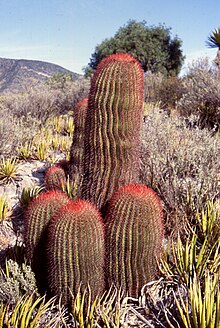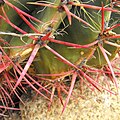
Stetsonia coryne, the toothpick cactus, is the sole species in the cactus genus Stetsonia. Stetsonia coryne grows to a height of 15 to 25 ft tall. It has white flowers. This cacti, also contains Mescaline /

Leuchtenbergia is a genus of cactus which has only one species, Leuchtenbergia principis. It is native to north-central Mexico. The genus is named after Maximilian Eugen Joseph (1817–1852), Duke of Leuchtenberg and amateur botanist.

Kroenleinia grusonii, popularly known as the golden barrel cactus, golden ball, "mother-in-law's cushion" or "mother-in-law’s chair" is a species of barrel cactus which is endemic to east-central Mexico.
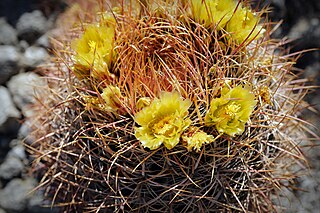
Ferocactus cylindraceus is a species of barrel cactus which is known by several common names, including California barrel cactus, Desert barrel cactus, compass barrel cactus, and miner's compass. It was first described by George Engelmann in 1853.

Ferocactus glaucescens, the glaucous barrel cactus, is a species of flowering plant in the family Cactaceae, native endemic to México.

Ferocactus echidne is a barrel cactus in the genus Ferocactus. It is found in nature in Mexico. This cactus is known commonly as Sonora barrel, Coville's barrel cactus, Emory's barrel cactus, and traveler's friend. This plant is often sold as a houseplant.

Ferocactus latispinus is a species of barrel cactus native to Mexico.

Pelecyphora strobiliformis is a species of cactus from Mexico. Its numbers in the wild have been reduced by collecting; it is listed in Appendix I of CITES but only as of "Least Concern" by the IUCN.

Oreocereus celsianus, or the old man of the mountain is a member of the family Cactaceae native to the high lands of the Andes in South America, and is named for its fluffy white hair, which may protect it from intense sunlight and extreme temperatures.

Ferocactus hamatacanthus, commonly named Turk's Head, is a barrel cactus in the tribe Cacteae.

Cochemiea conoidea, common name Texas cone cactus or Chihuahuan beehive, is a species of cactus native to southern United States to central Mexico.

Cochemiea goodridgei is a species of plant in the family Cactaceae. It is endemic to Mexican state Baja California.

Ferocactus gracilis, the fire barrel cactus, is a species of Ferocactus from Northwestern Mexico. This cactus gets its common name from the striking red coloration of its defensive spines and flowers.

Ferocactus pottsii is a species of Ferocactus from Mexico. The specific epithet has also been spelt pottsi.

Ferocactus histrix, also known as Acitrón barrel cactus is a species of Ferocactus native to central Mexico. It is a large barrel cactus that can be commonly found throughout all the Central Mexican matorral. It produces an edible fruit appreciated for its sour taste.

Ferocactus haematacanthus is a species of Ferocactus from Mexico.
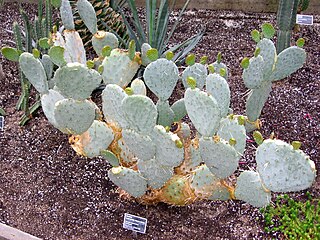
Opuntia setispina is a species of cactus found in the Sierra Madre Occidental in Chihuahua, Sonora, and Durango in Mexico. The name O. setispina has been listed as a synonym under Opuntia macrorhiza and Opuntia pottsii, but shows no close relationship to either species. It is more of a woody shrubby, often somewhat tree-like species, growing up to approximately 1 meter tall and wide. It is morphologically similar to Opuntia chlorotica, Opuntia santa-rita, and Opuntia gosseliniana.
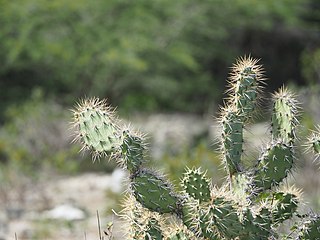
Opuntia caracassana is a species from the genus Opuntia. The species was originally described by Joseph zu Salm-Reifferscheidt-Dyck in 1850.

Matucana haynii is a species of Matucana found in Peru.

Echinocereus acifer is a species of Echinocereus found in Mexico
